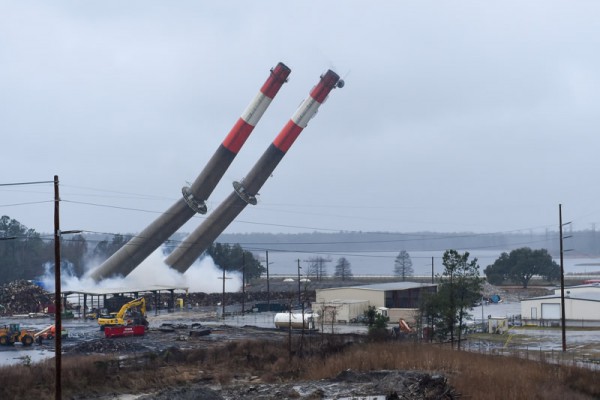
This pair of smokestacks at Santee Cooper’s Grainger Generation Station in Conway came down earlier this year after the coal-fired power plant was retired in 2012. Photo provided.By Lindsay Street, Statehouse correspondent | Exactly what state-owned Santee Cooper could look like as 2020 approaches is still up in the air. But state lawmakers are vowing significant changes are ahead for the 85-year-old public utility.
There are a range of options on the table from reforming the utility to outright sale. The legislature is accepting offers to manage, buy or buy parts of Santee Cooper until Jan. 14.
“Either we are going to make some reforms to current Santee Cooper and they will continue to operate … or possibly we could do what the governor is advocating, sell them but not the lakes,” Orangeburg Democratic Sen. Brad Hutto said. He is one of nine lawmakers on a panel evaluating the sale of Santee Cooper.
- Past news coverage: Sell Santee Cooper? Maybe, but not as a fire sale, senators say (Dec. 8, 2017)
Santee Cooper has been in legislative crosshairs for 18 months for its minority role in a $9 billion nuclear project that was canceled in 2017. The utility was in a partnership with S.C. Electric and Gas before the project was shuttered before completion. While SCE&G preemptively raised rates to pay for the project, Santee Cooper incurred debt for its share.
Gov. Henry McMaster has actively pushed for the sale of the utility but there was no mention of selling Santee Cooper as a priority this session during his inaugural address Wednesday.
Privatization of the state-owned utility is complicated by its debt and the utility’s other sprawling assets, which include two lakes, hydropower plants and water treatment plants.
Whatever decision is made ultimately, it could take months to a year for anything to be finalized, sources say.

Charleston Republican Sen. Paul Campbell, who is also on the Santee Cooper committee, said the 2019 legislative session will chart Santee Cooper’s future.
“It may take a while to close a deal but, my opinion is we will have a solution hopefully by the end of the legislative session,” Campbell said. “I want to have a direction by the end of this legislative term.”
But education could take priority over Santee Cooper, other lawmakers warn.
“I don’t think there is any appetite to have Santee Cooper rise up and knock education off of the pedestal for the year,” Hutto said. “There’s no imminent crisis at Santee Cooper. It’s not necessarily a good situation, but it’s manageable.”
The bids on the table
The state is currently accepting bids for state-owned utility, which employs about 1,650 people, manages two lakes, and helps the state with economic development. So far, a half dozen bids have been received since bidding opened in the fall, according to lawmakers familiar with the bidding process.

“Some would like to manage it, some would like to own it, and some would like to own part of it,” Hutto said. “There’s a lot of interest at some level.”
A report will be made by lawmakers after bidding closes this month.
In November, a panel of lawmakers approved a set of criteria for evaluating would-be buyers of the utility through an outside consulting firm ICF International of Virginia. Criteria include a competitive pricing and keeping rates low. There is also a weighted scale for evaluating buyers to help lawmakers determine the best offer. Lawmakers have also said they want to keep the utility headquartered in Moncks Corner and keep Lake Marion and Lake Moultrie as public lands.
Among the bids are at least two from the Electric Cooperatives of South Carolina, CEO Mike Couick told Statehouse Report. Central Electric Power Cooperative, which is represented by ECSC, is Santee Cooper’s largest customer, representing 59 percent of the utility’s revenues. Dominion Energy of Virginia, which purchased South Carolina Electric and Gas this month, is also reportedly a bidder.
By state law, only the General Assembly can sell Santee Cooper — a measure put in place after then-Gov. Mark Sanford moved to sell the utility in 2006. Santee Cooper and its employees are not allowed to lobby for or against the sale according to Mollie Gore, manager of corporate communication at Santee Cooper. But in a Nov. 27 investor presentation to lawmakers, officials wrote:
“Santee Cooper believes that it provides substantial value to the state and its customers through reliable and competitively priced power.”
A brief history of Santee Cooper
 Santee Cooper was created in 1934 to bring electricity to rural parts of the state during a time when utility providers had little economic incentive to bring service, Gore said. The first generating station, the Jefferies Hydroelectric Station at Pinopolis lock near Moncks Corner, began generating electricity in 1942. The utility is one of a score of state-owned utilities remaining in the nation.
Santee Cooper was created in 1934 to bring electricity to rural parts of the state during a time when utility providers had little economic incentive to bring service, Gore said. The first generating station, the Jefferies Hydroelectric Station at Pinopolis lock near Moncks Corner, began generating electricity in 1942. The utility is one of a score of state-owned utilities remaining in the nation.
The utility has 180,000 retail customers, many of whom are in Horry and Berkeley counties. Its largest customer is Central Electric Power Cooperative, which is comprised of 20 cooperatives in the state. With power sales in all 46 counties, Santee Cooper is the state’s largest electricity provider and one of the largest electricity generators, Gore said.
The utility also provides water to communities in Berkeley and Dorchester counties, manages thousands of acres of land and two lakes, and works as an arm for economic development in the state.
In the 1990s, Santee Cooper developed Mount Holly, which eventually landed a database farm for Internet search giant Google. When Volvo sought to locate in the United States, Santee Cooper purchased the giant tract known as Camp Hall and carved off a portion for the automaker. The rest of the site is being sold for similar support industries. The utility also offers economic development loans and grants, doling out more than $110 million since 2010.
Santee Cooper took out $4 billion in bond debt tied to the V.C. Summer nuclear project, bringing its total debt to more than $8 billion, according to 2017 numbers. About 79 percent of that debt is tax-free due to Santee Cooper’s public utility status, Gore said.
In a November 2018 investor presentation to the legislative committee, Santee Cooper officials wrote:
“If Santee Cooper were sold, a condition precedent to the closing of such a sale would be the retirement or defeasance of all outstanding debt, both tax-exempt and taxable.”
In 2017, Santee Cooper’s annual revenue was $1.76 billion. That same year, the utility generated 23,000 gigawatt hours (a gigawatt is one billion watts; that’s about 230 billion 100-watt light bulbs being powered for one hour). It’s assets are totaled at $13.2 billion.
What lawmakers say
Berkeley County Republican Sen. Larry Grooms, whose district includes Santee Cooper, offered caution for the utility’s privatization last year.

“Santee Cooper has proven itself to be one of our state’s greatest assets,” Grooms wrote via text in December 2017. “In addition to providing low-cost, reliable electricity for over 2 million South Carolinians, this agency is the economic (engine) responsible for attracting high-quality, high-paying industries like Nucor, BP, Google and Volvo to our area … I’ll be waiting in the Senate to kill such a foolhardy proposal should one ever make it that far.”
When reached this year to see if his views had changed, he wrote via text: “I am not going to comment on Santee Cooper. Loose lips sink ships.”
Hutto and Campbell both said the future of Santee Cooper is unknown at this time, though they both expect to have an answer by the end of February.
“Things are going to change for sure,” Campbell said. He added that he was confident that the General Assembly would be capable of “multitasking” on reforming education and dealing with the question of Santee Cooper this year.
Hutto said he and other lawmakers are being “methodical” in their approach to restructuring or selling the utility.
“It will be up to us in how we structure that into a report (for other lawmakers),” Hutto said. “We are going through that process now.”
Several bills seeking to reform Santee Cooper or provide additional oversight for the utility failed in the 2018 legislative session.
- Have a comment? Send to: feedback@statehousereport.com



Can Santee be repurposed to be the lead for solar and the provision to rural and low income households?